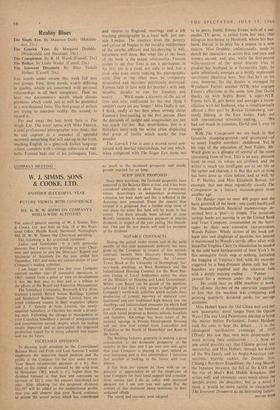Reality Blues
The Garrick Year. By Margaret Drabble. (Weidenfeld and Nicolson, 18s.) The Innocent Dreamers. By Alice Tisdale Hobart. (Cassell, 21s.) THE novels under review this week fall into two groups. First, three novels, widely differing in quality, which are concerned with personal relationships in all their complexity. Then we have two documentary novels which discuss problems which could just as well be presented in a non-fictional form. The first group of writers are trying to interpret reality; the second, to record it.
Far and away the best book here is The Single Eye. The novel opens with Mike Fannon, a semi-professional photographer who thinks that he can capture in a sequence of splendid moments something that will add up to the truth, teaching English in a gimcrack Italian language school, complete with a vintage collection of odd- balls. Fannon beds one of his colleagues, Toni, and returns to England, marriage and a job teaching photography in a local tech. just out- side London. The contrast from the poverty and colour of Naples to the metallic indifference of the exurbs, efficient and life-denying, is well, extremely well done. But what lies at the heart of the book is the sexual relationship. Fannon comes to see that Toni is not a participant in his life; she is a rival, not only in bed, but a rival who even starts copying his photographic style. One or the other must be completely dominated and therefore psychically destroyed. Fannon falls in love with his brother's wife and, sensibly, decides to run for freedom and -sanity. . . . `We'd made a travesty of the act of love and now confronted by the real thing I couldn't carry on any longer.' Miss Duffy is not, I think, really at her best when writing about Fannon's love-making in the first person. Here the demands of insight and imagination are just too much for her. But, nevertheless, this is a first-class story with the writer often displaying that grasp of reality which marks the true novelist.
The Garrick Year is also a second novel con- cerned with marital relationships, but one which, when compared with The Single Eye, turns out to be pretty feeble. Emma Evans, wife of a suc- cessful TV actor, is exiled from her nice, chic Islington box-house to Hereford, where her hus- band, David, is to play for a season in a new theatre. Miss Drabble, unfortunately, tends to sketch her characters as actors first and men and women second; and, alas, while the first-person wifey-narrator of the novel bravely tries to present her husband in a favourable light, he quite relentlessly, emerges as a mildly unpleasant narcissistic theatrical bore. Not that he's on his own, however, for the theatre is managed by Wyndham Farrar, another NTB, who engages Emma's affections at the same time that David shacks up with Sophy Brent, a super-NTB. Emma falls ill, gets better and manages a recon- ciliation with her husband, who is simultaneously offered a film part by Rockie Goldenberg, cur- rently filming in the East Indies. Fade out with conventional novelette ending. . • 'We had too much in common, David and I, ever to escape.'
With The Conspirator we are back in that favourite stamping-ground--and graveyard—of so many English novelists: childhood. Yet in his saga of the education of Neil Falder, Mr. Ward gives us a glimpse of several of the more interesting faces of love. This is an easy, pleasant book to read, its values are civilised, and the writer is much too intelligent not to see life as the rather sad charade it is. But this sort of thing has been done so often before, and so well, by L. P. Hartley and Miss Elizabeth Bowen, for example, that one must regretfully classify The Conspirator as a literary museum-piece from another age.
The Banker inns to over 460 pages and the basic gimmick of the book—one could hardly call the Neanderthalish financial manceuvrings de- scribed here a `plot'—is simple. The socialistic savings banks are moving in on the United Bank and Trust Company, commanded on the barri- cades by their new executive vice-president, Woods Palmer. Whole sectors of the book col- lapse into vast slagheaps of pastiche, but interest is maintained by Woods's terrific office affair with beautiful Virginia Clary Ca stimulation he needed in the cold hard battleground of New York'). In this menagerie rivals stop at nothing, including the bugging of Virginia's bed, with the recorder triggered by a long-distance phone call, but the boarders are repelled and the takeover fails with a deeply moving ending . . . 'Palmer . . • paused for a moment under the high ceiling- . . . He could hear an IBM machine at work. The off-beat rhythm of the operation suggested to him that the machine was computing and printing quarterly dividend cards for savings accounts. . .
Miss Hobart knew the Old China well and her new `panoramic' novel ranges from the Opium Wars (`The day Lord Palmerston decided to bring the matter before Parliament, James Haldane took his sons to hear the debate . . .') to the ideological rectification campaign of 1957 ('Dimly Ho saw that men were desperately at
work writing their confessions . . Now no one could possibly say that Chinese period was uneventful, and Miss Hobart, through her device of the Wu family and its Anglo-American con- nections, bravely tackles the Double Ten, Chiang's Northern Expedition, the Long March. the Japanese invasion, the fall of the KMT and the rise of Mao's Red Middle Kingdom. She writes well, and obviously cares much about the terrible events she describes; but as a novel r think it would be more tactful to characterise The Innocent Dreamers as an interesting failure.
DAVID REES
























 Previous page
Previous page